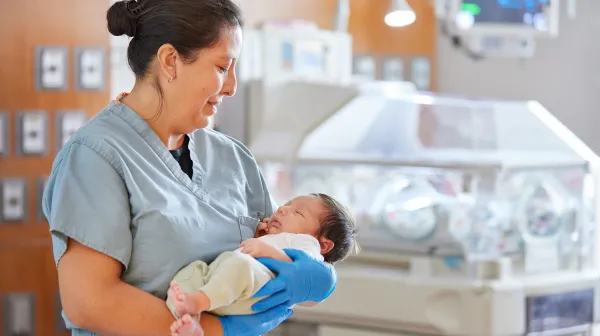Neonatology
Clinical Care
What we do
NNPs at Texas Children's Hospital are responsible for providing safe care for critically ill neonates. This includes:
- Attend high risk deliveries
- Perform advanced practice skills
- Establish a daily plan of care
- Evaluate patient outcomes with implemented interventions
- Maintain open communication and serve as an educational resource for patient families
- Ensure safe transitions from a hospital setting to the home environment
NNPs at Texas Children's Hospital are vital members of the healthcare team within one of the nation’s largest neonatal intensive care units (NICU). NNPs work with a multidisciplinary team including Neonatologists, Registered Nurses, Respiratory Therapists, Nutritionists, Pharmacists, Social Workers, Care Managers, and specialty consultation services to provide care for our patients.
NNPs have the opportunity to work in multiple settings:
- Level IV NICU provides the highest level of specialized care. Examples of patients include neonates with congenital cardiac defects, surgical patients (including but not limited to Gastroschisis, Omphalocele, Tracheal Esophageal Fistula, Congenital Diaphragmatic Hernia), patients requiring Extracorporeal Membranous Oxygenation (ECMO), neonates requiring intestinal rehabilitation, and patients with Hypoxic Ischemic Encephalopathy requiring total body cooling.
- Level 2 NICU – lower acuity unit with babies who are healthier, bigger and may be ready to transition to home
- Pavilion for Women NICU is a blended-care NICU providing state-of-the-art medical care in a family-centered environment. NNPs at the Pavilion for Women are part of the team that attends high risk deliveries.
- Transport Team – NNPs are a valuable team member during inter-hospital transports of critically ill neonates across the nation.
The Texas Children's Fetal Center is world renowned for their in-utero procedures. Patients travel from all over the world for fetal repair of clinical conditions to improve outcomes post-delivery. Some of the procedures include myelomeningocele repair, tracheal balloon placement for infants with severe congenital diaphragmatic hernia, and cardiac interventions. After delivery these patients are managed in the NICU by a multidisciplinary team consisting of Neonatologists, NNPs, and Pediatric Surgery.
Explore more

From the NICU to the Green: Meet Asher, the Bad Pants 2025 Featured Fighter


26th Annual Bad Pants Open Golf Tournament Raises Over $400,000 for Texas Children’s Neonatal I...

Bad Pants Open 25th Annual Charity Golf Tournament Raises $330,000 for Texas Children's Hospital ...
Texas Children’s Hospital Remains No. 1 Pediatric Hospital in the State of Texas for 15th Conse...

